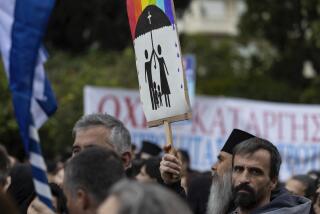Human Rights Strikes Back : Will We Now Welcome a Wide Range of Soviet Nationalities?
- Share via
As different as they are, Mikhail S. Gorbachev and George Bush do have one thing in common--a Soviet nationality problem that confronts both men with unexpected dilemmas.
For years Moscow claimed that the nationality “question” had been solved. In turn, Washington tacitly accepted this view by demoting non-Russians to non-issues. But the non-Russians have struck back with a vengeance. And now the carefully constructed policies of both sides-- perestroika and human rights--may be in danger of collapse.
For Gorbachev, the problem is particularly acute. Wittingly or not, he has opened a Pandora’s box of ethnic tensions. Glasnost has permitted people to voice their opinions, vent their frustrations and release their aggressions. Political reform has unrealistically raised expectations and encouraged the Soviet populace to organize in support of formerly forbidden ends. Economic reform--or, more exactly, the continued failure of economic reform--has added fuel to the fire of popular passions.
The December, 1987, riots in Alma-Ata, the Nagorno-Karabakh crisis, the phenomenal appeal of the secessionist Baltic popular fronts, the exposure of secret police crimes in Byelorussia and the Ukraine, and, most recently, the ethnic violence in Uzbekistan and Kazakhstan are the direct consequence of glasnost and perestroika . As such, these developments jeopardize Gorbachev’s reform program by threatening to destabilize the Soviet system. Eventually, Gorbachev will have to choose between saving the Soviet system by retrenching or risking chaos by pursuing present policies.
For Bush the problem is less threatening but more embarrassing. After trumpeting the sanctity of human rights during the Leonid Brezhnev period, when political repression was intense and the probability of the Soviets responding favorably to American criticism was small, the United States is now in the distinctly uncomfortable position of having to put its money where its mouth was.
It will be hard for Washington to turn away growing numbers of potential Soviet immigrants--not only Jews, but also Russians, Ukrainians, Armenians, Central Asians and those from the Baltic republics--after championing their cause for so many years. But it will be equally difficult to welcome a Soviet immigrant tide at a time when immigration and the budget deficit have become such volatile political issues and when Third World peoples face far greater oppression than do Soviets.
Even more nettlesome is that Washington’s rhetoric demands that the United States be consistent with its own logic and admit the importance of all human rights, including that of nations to self-determination, thus countenancing, if not actually encouraging, the Soviet Union’s breakup.
Gorbachev could have avoided his dilemma by dealing with the nationality question more vigorously in the first four years of his tenure. Instead, he chose to ignore the Soviet Union’s ethnic problems, which finally exploded and caught him unaware. A Communist Party plenum is supposed to discuss ethnic relations this summer, but with passions running as high as they are, it may be impossible for it develop policies that do not outrage significant segments of the Soviet public.
Washington could have avoided its dilemma by recognizing that human rights cannot be applied selectively--to individual dissidents and nations, but not to all of the Soviet Union’s 285 million people and 100-plus nationalities--and that demands for free emigration by Jews logically entail free emigration by everyone else. A less self-righteously crusading approach could have spared Washington the loss of face that may occur when ethnic instability and growing pressure for immigration force the United States to reconsider its verbal commitment to human rights.
Although Gorbachev’s position is potentially more dangerous, it is also more manageable in the short run. With some luck, Moscow may come up with a modified version of perestroika that keeps ethnic tensions in check while ensuring that the economy continues to limp along. The future will be less rosy for the Soviets, but for now they can probably repress a little and reform a little and squeak by.
Not so for Washington. Human rights are an either/or proposition: one either supports them wholeheartedly or one does not support them at all--or, alternatively, one pretends to support them and, inevitably, is exposed as a fraud. Pretty soon, Americans will have to decide what, if anything at all, human rights really mean to them. And, like Gorbachev, they will have to make a very hard choice between championing human rights and accepting domestic hardship and foreign instability or opting for stability at home and abroad and abandoning the human-rights crusade.
More to Read
Sign up for Essential California
The most important California stories and recommendations in your inbox every morning.
You may occasionally receive promotional content from the Los Angeles Times.













